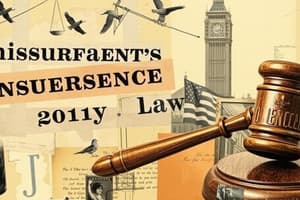Podcast
Questions and Answers
What is required for a contract to be legally valid?
What is required for a contract to be legally valid?
- Offer and acceptance
- Consideration
- Legal purpose
- All of the above (correct)
What is the legal term for a written contract in which one party promises to indemnify another against loss from an unknown event?
What is the legal term for a written contract in which one party promises to indemnify another against loss from an unknown event?
- Endorsement
- Policy (correct)
- Counter-offer
- Agreement
Who initiates the offer of an insurance contract?
Who initiates the offer of an insurance contract?
- The insurance agent
- The applicant by submitting the application with the initial premium (correct)
- The state insurance commissioner
- The insurer by providing a quote
What happens when an offer is answered by a counter-offer in a contract negotiation?
What happens when an offer is answered by a counter-offer in a contract negotiation?
Which of the following is NOT a requirement for a legally binding contract?
Which of the following is NOT a requirement for a legally binding contract?
In what situation is the applicant not presumed to be competent?
In what situation is the applicant not presumed to be competent?
What is a policy rider or endorsement?
What is a policy rider or endorsement?
Which element of a contract involves the value given in exchange for the promises sought?
Which element of a contract involves the value given in exchange for the promises sought?
Which type of contract pays a stated sum regardless of the actual loss incurred?
Which type of contract pays a stated sum regardless of the actual loss incurred?
What is the primary purpose of tort law?
What is the primary purpose of tort law?
What type of claims fall under contract law?
What type of claims fall under contract law?
Which insurance policies are examples of indemnity contracts?
Which insurance policies are examples of indemnity contracts?
Which principle is NOT a characteristic of an indemnity contract?
Which principle is NOT a characteristic of an indemnity contract?
What is a contract in which there is an element of chance and potential for unequal exchange of value for both parties?
What is a contract in which there is an element of chance and potential for unequal exchange of value for both parties?
Which of the following best describes a void contract?
Which of the following best describes a void contract?
What differentiates a voidable contract from a void contract?
What differentiates a voidable contract from a void contract?
Which type of contract is prepared by one party without negotiation and can only be modified by that party?
Which type of contract is prepared by one party without negotiation and can only be modified by that party?
Under the parol evidence rule, what is prohibited?
Under the parol evidence rule, what is prohibited?
In which type of contract does the insurer promise to pay benefits upon the occurrence of a specific event, without requiring the applicant to promise to pay premiums?
In which type of contract does the insurer promise to pay benefits upon the occurrence of a specific event, without requiring the applicant to promise to pay premiums?
Which type of contract insures a person and not the property itself?
Which type of contract insures a person and not the property itself?
What happens if an insurer fails to enforce a provision of a contract?
What happens if an insurer fails to enforce a provision of a contract?
What condition must hold true for an insurer to fulfill its promise to pay benefits?
What condition must hold true for an insurer to fulfill its promise to pay benefits?
Which term refers to the voluntary act of terminating an insurance contract?
Which term refers to the voluntary act of terminating an insurance contract?
What is the contestability period in the context of insurance contracts?
What is the contestability period in the context of insurance contracts?
In insurance contracts, which principle requires both parties to disclose all material facts and relevant information?
In insurance contracts, which principle requires both parties to disclose all material facts and relevant information?
What does the term 'estoppel' refer to in insurance contracts?
What does the term 'estoppel' refer to in insurance contracts?
Which of the following is NOT a characteristic of a unilateral contract?
Which of the following is NOT a characteristic of a unilateral contract?
In which situation can a voidable contract be set aside?
In which situation can a voidable contract be set aside?
Which of the following correctly defines a personal contract?
Which of the following correctly defines a personal contract?
What does estoppel protect an insured against?
What does estoppel protect an insured against?
In what capacity does an insurance agent act when they accept premiums on behalf of the insurer?
In what capacity does an insurance agent act when they accept premiums on behalf of the insurer?
What is the primary purpose of subrogation in insurance?
What is the primary purpose of subrogation in insurance?
Which type of insurance agent is NOT specifically mentioned as being offered E&O Insurance?
Which type of insurance agent is NOT specifically mentioned as being offered E&O Insurance?
Which of the following is a typical loss covered under an E&O policy?
Which of the following is a typical loss covered under an E&O policy?
What is a common exclusion in an E&O Insurance policy?
What is a common exclusion in an E&O Insurance policy?
What does the rule of 'Reasonable Expectations' reinforce?
What does the rule of 'Reasonable Expectations' reinforce?
Which of these would likely result in a covered loss under E&O policy?
Which of these would likely result in a covered loss under E&O policy?
What does an E&O insurance policy typically exclude?
What does an E&O insurance policy typically exclude?
Which of the following best describes a warranty in an insurance policy?
Which of the following best describes a warranty in an insurance policy?
What differentiates a representation from a warranty in an insurance policy?
What differentiates a representation from a warranty in an insurance policy?
What could be grounds for voiding an insurance policy under concealment?
What could be grounds for voiding an insurance policy under concealment?
When would an injured party have the right to rescind an insurance contract under concealment?
When would an injured party have the right to rescind an insurance contract under concealment?
Which characteristic is specific to a void contract?
Which characteristic is specific to a void contract?
In the context of insurance, what is a material misrepresentation?
In the context of insurance, what is a material misrepresentation?
How can an express warranty in an insurance policy be qualified?
How can an express warranty in an insurance policy be qualified?
Flashcards are hidden until you start studying
Study Notes
General Law of Contracts
- Contracts of insurance are binding legal agreements and are enforceable by law.
- A "policy" is a written contract in which one party promises to indemnify another against loss that arises from an unknown event.
- A policy rider or endorsement is a legal attachment amending a policy.
Elements of a Valid Contract
- Offer and acceptance: a meeting of the minds, definite proposal, and acceptance of exact terms.
- Consideration: value given in exchange for promises sought, such as premium and completed application.
- Legal purpose: object of the contract and reason for entering into the agreement must be legal.
- Competent parties: insurer must be licensed or authorized, and applicant is presumed competent unless proven otherwise.
Types of Contracts
Aleatory Contracts
- Element of chance and potential for unequal exchange of value or consideration.
Adhesion Contracts
- Prepared by one party (insurer) with no negotiation between applicant and insurer.
- Contract can only be modified by the insurance company.
Unilateral Contracts
- Only one party (insurer) makes an enforceable promise.
- Insurer promises to pay benefits upon the occurrence of a specific event.
Personal Contracts
- Owner (person) of the property is insured, not the property itself.
Conditional Contracts
- Insurer's promise to pay benefits depends on the occurrence of an event covered by the contract.
Utmost Good Faith
- Both parties must know all material facts and relevant information.
- No attempt to conceal, disguise, or deceive.
Reasonable Expectations
- Ambiguities in insurance contracts should be interpreted in favor of the policyholder.
- Insured is entitled to coverage under a policy that a sensible and prudent person would expect it to provide.
Warranty
- Statement made by the applicant that is guaranteed to be true in every respect.
- Becomes part of the contract, and if found to be untrue, can be grounds for revoking the contract.
Representation
- Statement made by the applicant that they consider to be true and accurate to the best of their belief.
- Used by the insurer to evaluate whether or not to issue a policy.
Concealment
- Failure or neglect by the applicant to disclose a known material fact.
- If intentional, insurer may void the policy; if unintentional, injured party has the right to rescind the contract.
Void versus Voidable Contracts
Void Contract
- Agreement without legal effect, missing one of the elements specified by law for a valid contract.
- Cannot be enforced by either party.
Voidable Contract
- Agreement that, for a reason satisfactory to the court, may be set aside by one of the parties in the contract.
- Legally binding unless the party with the right to reject it wishes to do so.
Fraud
- Can be a reason to void a contract, under some types of insurance contracts, insurer has a limited period to challenge the validity of a contract.
Parol Evidence Rule
- When parties put their agreement in writing, all previous verbal statements come together in that writing, and a written contract cannot be changed or modified by parol (oral) evidence.
Waiver
- Voluntarily relinquishing or abandoning a known right under an insurance contract.
Estoppel
- Loss of defense, protects an insured if the insurer or its producers make an error, and later the insurer attempts to deny a claim.
Insurance Agent Errors and Omissions
Estoppel
- Protects an insured if the insurer or its producers make an error, and later the insurer attempts to deny a claim.
Agent as a Fiduciary
- A fiduciary is a person who holds a position of financial trust and confidence.
Subrogation
- Right for an insurer to pursue a third party that caused an insurance loss to the insured.
Insurance Agent Errors and Omissions Professional Liability Insurance (E&O)
- Professional liability insurance for insurance agents.
Tort Law
- Provides full compensation for proved harm.
Valued or Indemnity
Valued Contract
- Pays a stated sum regardless of the actual loss incurred.
Indemnity Contract
- Pays an amount equal to the loss, aiming to make the insured "whole again".
Studying That Suits You
Use AI to generate personalized quizzes and flashcards to suit your learning preferences.




